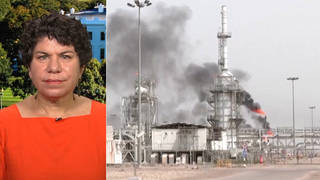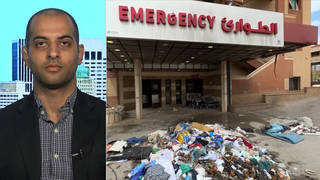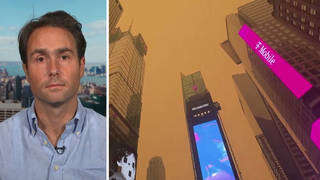
Guests
- Molly Wickhamland defender and matriarch of the Gidimt’en Clan of Wet’suwet’en Nation.
Wielding assault rifles, helicopters and canine units, Canadian police raided Wet’suwet’en territory this week and arrested 14 people in an effort to break up the Indigenous-led blockade of the multibillion-dollar Coastal GasLink pipeline being constructed by TC Energy. The occupation started in September and halted the company’s efforts to build a key portion of the over 400-mile pipeline within Wet’suwet’en lands that violates both Wet’suwet’en and Canadian laws. We speak with land defender and matriarch of the Gidimt’en Clan of Wet’suwet’en Nation Molly Wickham, one of the witnesses to the police raid. “This project does not have free, prior, informed consent of the Wet’suwet’en people,” says Wickham. “It’s as if we don’t exist as Indigenous people and that we don’t have our own governance and that we don’t have our own system of law.”
Transcript
AMY GOODMAN: This is Democracy Now!, democracynow.org, The War and Peace Report. I’m Amy Goodman.
In Canada, heavy militarized officers with the Royal Canadian Mounted Police raided Wet’suwet’en territory Thursday with assault rifles and dogs, trying to put an end to a 50-day Indigenous blockade to block TransCanada’s 400-mile, $4.7 billion Coastal GasLink pipeline. At least 14 people were arrested. The raid came on the same day Canadian Prime Minister Justin Trudeau met with President Biden at the White House as 18,000 residents of British Columbia remained cut off by floodwaters and mudslides after torrential rains brought what officials have described as a one-in-500-year flood.
The Wet’suwet’en occupation started in September and halted the company’s efforts to build a key portion of the over 400-mile pipeline that would transport natural gas from Dawson Creek in northeastern British Columbia to the province’s north coastal region. On Thursday, Molly Wickham, an Indigenous land defender, recorded this video during the police raid.
MOLLY WICKHAM: The RCMP are invading Wet’suwet’en territory once again. There have been approximately 15 arrests that have happened already at the Gidimt’en checkpoint. Legal observers, media have been arrested. Two of our Wet’suwet’en elders have been arrested and removed from the territory. Right now we’re at Coyote Camp, and the RCMP are moving in to remove me from my territory. This invasion once again speaks to the genocide that’s happening to Indigenous people that are trying to protect our water for our future generations. It’s infuriating. It’s illegal, even according to their own means of colonial law. We need to shut down Canada.
Our Haudenosaunee relatives have been arrested, violently arrested. They’ve been removed from our territories. They’re removing Wet’suwet’en people from our own lands. They’re planning to drill under Wedzin Kwa and destroy our sacred headwaters. We need people to act. You need to act where you are now. Shut down major infrastructure. Do whatever you can. Rally against the investors. Shut down the investors to this project so that it is very clear that Indigenous people will not stand for the genocide that’s happening to our lands and to our future generations.
AMY GOODMAN: Thursday’s raid came after the Wet’suwet’en Nation issued its own eviction notice on Sunday to Coastal GasLink workers. When the workers attempted to access the roads, Indigenous land defenders refused to allow them to enter. The workers then reported the blockade to the Royal Canadian Mounted Police and issued an injunction.
LAND DEFENDER 1: Road’s closed.
LAND DEFENDER 2: Road’s closed, man, no matter what you say.
COASTAL GASLINK WORKER: So, we’re here from Coastal GasLink project. We are here to conduct work on behalf of the Coastal GasLink project. And you’re impeding us. Can you please move your blockade out of the area?
LAND DEFENDER 1: Nothing to say.
COASTAL GASLINK WORKER: We have our —
LAND DEFENDER 2: [shouts]
COASTAL GASLINK WORKER: — Supreme Court injunction [inaudible] —
LAND DEFENDER 2: [shouts]
COASTAL GASLINK WORKER: — that anyone having [inaudible] —
LAND DEFENDER 2: [shouts]
COASTAL GASLINK WORKER: — are restrained from [inaudible] —
LAND DEFENDER 2: [shouts]
COASTAL GASLINK WORKER: — and physically prevent [inaudible] restricting —
LAND DEFENDER 2: [shouts]
COASTAL GASLINK WORKER: — conducting work. Will you remove your blockade —
LAND DEFENDER 2: [shouts]
COASTAL GASLINK WORKER: —to allow us to conduct our work?
LAND DEFENDER 1: Nothing to say.
LAND DEFENDER 2: [shouts]
COASTAL GASLINK WORKER: As you’re not removing your blockade and continue to —
LAND DEFENDER 2: [shouts]
COASTAL GASLINK WORKER: — we’ll be advising that we will be reporting this to the RCMP as a breach —
LAND DEFENDER 2: [shouts]
COASTAL GASLINK WORKER: — of an order. Here’s a copy of the injunction. Thank you for your time.
LAND DEFENDER 2: [shouts]
AMY GOODMAN: The Indigenous land defenders then burned the injunction in a bonfire.
For more, we go to Molly Wickham, also known as Sleydo’. She’s a land defender, matriarch of the Gidimt’en Clan of Wet’suwet’en Nation, we heard describing the raid as it happened. She’s a leader in this protracted battle against the pipeline.
Molly, welcome back to Democracy Now! Describe more in detail what has taken place, the raid yesterday, and what this means, why you’ve been devoting scores of days to this.
MOLLY WICKHAM: Yeah. So, today is day 56 of the occupation of the drill pad site. There are Coastal GasLink plans to drill underneath Wedzin Kwa, which is our sacred headwaters, one of our last clean drinking water sources, our major spawning salmon river. No consent to drill under Wedzin Kwa or cross Wedzin Kwa whatsoever by our nation.
On Sunday, November 14th, the Coastal GasLink was given eight hours’ notice to evacuate the territory based on an eviction order by the hereditary chiefs of the Wet’suwet’en Nation of all five clans in January of 2020. And so, this was an enforcement of that order, in order to show Coastal GasLink and the investors and the people that are supporting this project that this project does not have the free, prior, informed consent of the Wet’suwet’en people. And so, we provided the workers from the man camp eight hours to vacate the territory. All of the vehicles were allowed out of the territory. Right as the deadline was approaching, the RCMP called Chief Woos and asked for a two-hour extension, which Chief Woos granted to them. So they had 10 hours to leave the territory before the road was closed.
And after, they did not make one move to try to leave the territory. We were informed later that Coastal GasLink workers, not all of them were told by Coastal GasLink and instructed to leave the territory or that they would be blocked in, and so nobody left. They all stayed there voluntarily. And then the road was closed after 10 hours of giving them the opportunity to leave.
AMY GOODMAN: Can you talk about the corporation directly that’s involved and its relationship to the Canadian government?
MOLLY WICKHAM: Yeah. So, the corporation, the owners are TC Energy; KKR, which is a private equity investment firm; and AIMCo, which is an investment firm, as well, from Alberta, which actually is caught up with Alberta RCMP pension funds. And so, TC Energy owns the least amount. And there’s also the major investors are the major five Canadian banks, that are — and RBC, Royal Bank of Canada, is the one funding most of the construction for this project. And so, there’s a lot of Canadian pensions, pension funds, that are invested in these private equity firms that are paying, that own this company. And around the world, there’s huge investment into this company, that people aren’t even aware that it’s their pension funds that are paying for this destruction of our territory.
AMY GOODMAN: On Wet’suwet’en territory, the Gidimt’en Clan set up a cabin on the drill pad site where Coastal GasLink plans to drill.
MOLLY WICKHAM: This is the drill pad site where they plan to drill under Wedzin Kwa. And we have a new home here, a new cabin here, a log cabin that’s going to be here and stay here and will be housing Cas Yikh and Gidimt’en and Wet’suwet’en people for generations to come. … And they won’t be coming in here anytime soon to be drilling under Wedzin Kwa. We’re occupying this space. People are going to be living here, and it will be occupied from now on.
AMY GOODMAN: Is that where you are right now, Sleydo’?
MOLLY WICKHAM: Yes. We are at Coyote Camp, which is the drill pad site. Dinï ze’ Woos, our house chief for our Cas Yikh house of the Gidimt’en Clan, his daughter is currently residing in that cabin at Coyote Camp. And we are holding down. Coyote Camp has not been raided. We just heard on the communications that there are two buses of RCMP headed out our way right now on the Forest Service road, and we’re still here. And we are holding this space as long as we possibly can.
Yesterday, there was 30 to 50 militarized RCMP that entered Gidimt’en checkpoint, which is another Gidimt’en occupation site 20 kilometers down the Forest Service road from us. And they brought a canine unit. They had helicopters. They had assault rifles, sniper rifles. You know, in previous years, they had lethal overwatch, and I’m sure that was the case yesterday again. There were violent arrests made. Two of our elders were arrested and removed from the territory, one which was denied her — our matriarch in our house was denied her medication after an exclusion zone was set up by the RCMP. And then she was sent to hospital yesterday with chest pains because she had not received her heart medication.
AMY GOODMAN: Last year in Ontario, a Mohawk solidarity protest shut down the Canadian National Railway for days, halting travel for tens of thousands of passengers. I want to turn to Prime Minister Justin Trudeau responding to the solidarity protests.
PRIME MINISTER JUSTIN TRUDEAU: We recognize the important democratic right, and we will always defend it, of peaceful protest. This is an important part of our democracy in Canada. But we’re also a country of the rule of law. We need to make sure those laws are respected. That is why I will be — I am encouraging all parties to dialogue to resolve this as quickly as possible.
AMY GOODMAN: So, if you could respond to what Prime Minister Trudeau is saying? He just met yesterday with President Biden and the Mexican president, AMLO, Andrés Manuel López Obrador. He’s pushing for Line 5 through Michigan, which the Michigan governor has said no to, afraid it will pollute the Great Lakes. Overall, your message? This in the midst of, in another part of British Columbia, you have these one-in-500-year floods.
MOLLY WICKHAM: Yeah. So, I do want to speak to Trudeau’s rule of law. I feel like the rule of law is inherently racist, and when they use that terminology in this context, it’s extremely racist, because it does not consider Indigenous law. It’s as if we don’t exist as Indigenous people and that we don’t have her own governance and that we don’t have our own system of law. And calling the rule of law and following the rule of law in Canada totally erases us as Indigenous people. And we are here holding up Wet’suwet’en law. That is why we are here. We are not protesters. We’re not just here protesting, you know, this one project. We’re here to uphold Wet’suwet’en law, as we have for thousands of years. And that means protecting our river at all costs.
At this time, there’s a — you know, BC declared a state of emergency, and so there are people literally stranded on their roofs. There are people that have died. And the RCMP have sent in two planeloads, four buses full and multiple helicopters to use in raiding our territory on unarmed Indigenous people. And so, that, to me — you know, this climate crisis that has caused this disaster, and the resources that the government is willing to direct to criminalizing Indigenous people instead of addressing the actual climate issue, speaks to the discrepancy between what is being said in the government —
AMY GOODMAN: Molly Wickham, we’re going to have to leave it there, also known as Sleydo’. We’ll continue to cover this issue. I’m Amy Goodman. Thanks for joining us.













Media Options